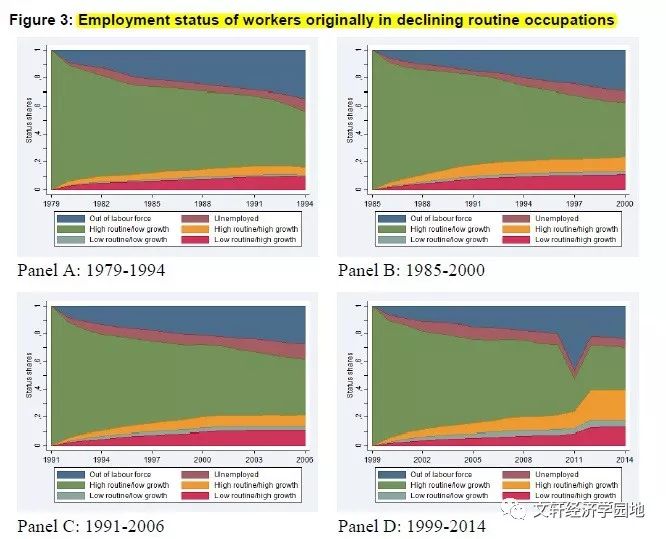U Blien,W Dauth,D Roth. The Decline of Routine Jobs and Occupational Mobility. Working Paper, 9 June 2017
Abstract: Technological change caused a secular decline in routine intensive occupa-tions while non-routine occupations grew. We first document that this development hap-pened also in Germany during the last 35 years. However, it remains an open question whether this development is mediated by occupational mobility or labour market exit and entry. We examine the detailed employment biographies of a large sample of Ger-man workers who were most affected by technological change: those who worked in declining routine intensive occupations at the onset of technological change. We follow their careers and analyze how individual and regional characteristics affect the transition into other types of occupations or into unemployment.
以往研究表明,随着计算机技术、自动化技术的进步,程序较强工作岗位趋于减少而程序性较弱工作岗位趋于增加。论文作者用德国的经验数据再次证实了这一结论,实证分析结果显示:岗位的就业增长率与岗位的程序性强弱显著负相关,程序性越强的工作岗位其增长率越低。对于程序性强弱不同岗位数量此消彼长的这种现象,作者提出了一个非常重要的问题——就业市场上的这种变化是如何形成的?是通过劳动力在不同工作岗位间的流动,还是通过原有劳动力的退出和新劳动力的进入。作者运用德国劳动者就业状况的抽样追踪调查数据进行了实证研究,结果发现:原先在程序性较强岗位上工作的劳动者,有相当一部分因岗位数量减少而不得不离开原有职位,但离职者中只有较少比例流动到程序性较弱的新岗位,而更多人成为失业者或退出劳动力市场;与之相对照,在程序性较弱岗位上工作的劳动者,他们的就业状态比较稳定,只有很少人失业或流动到程序性较强的新岗位。这一实证结果有很重要的含义:在人工智能技术进步情况下,程序性较强岗位上的失业者实现再就业的难度较高。尽管新技术带来程序性较弱工作岗位数量的增长,但他们未必有能力获得这些新增的就业机会。

 ai论文查重
ai论文查重